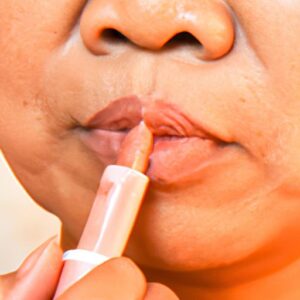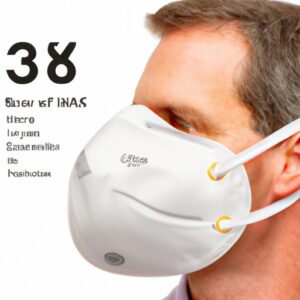Lymph nodes play a vital role in our immune system, acting as filters that trap harmful substances and produce immune cells to help fight off infections. On the other hand, deodorants are everyday personal care products that many of us rely on for odor control. But have you ever wondered if there could be a connection between deodorant use and swollen lymph nodes? In this article, we will explore this intriguing topic and shed light on what research suggests.
Before delving into the potential effects of deodorant on lymph nodes, let’s first understand the importance of these tiny, bean-shaped glands. Lymph nodes are distributed throughout our body and are part of the lymphatic system, which plays a crucial role in removing waste, toxins, and foreign substances from our bodies. They act as checkpoints, filtering and monitoring the lymphatic fluid for any signs of infection or disease.
Deodorants, particularly antiperspirants, are designed to minimize body odor by reducing sweat and controlling bacterial growth. They often contain various ingredients, including fragrances, preservatives, and most notably, aluminum. While aluminum compounds effectively block sweat glands, preventing excessive sweating, concerns have been raised about their potential impact on our health.
Stay tuned as we explore the relationship between deodorant use and swollen lymph nodes. We will examine the ingredients commonly found in deodorants, particularly aluminum, and the controversies surrounding their potential health effects. Additionally, we will dive into the existing research exploring the link between deodorant use and swollen lymph nodes.
Remember, your health matters, and being informed about the products you use is essential. So, let’s embark on this journey together to uncover the truth behind the question: can deodorant cause swollen lymph nodes?
Understanding Swollen Lymph Nodes
Swollen lymph nodes, also known as lymphadenopathy, refer to the enlargement of lymph nodes beyond their normal size. This condition can occur for various reasons and serve as a signal that something is amiss in your body’s defense system. Understanding the causes and significance of swollen lymph nodes is crucial for assessing their potential connection to deodorant use.
Definition and Causes of Swollen Lymph Nodes
Swollen lymph nodes can be caused by a range of factors, including infections, immune disorders, and even certain types of cancer. When your body detects an infection or disease, the lymph nodes nearest to the affected area may enlarge as they work to filter out and combat the harmful substances. Infections such as the common cold, strep throat, and ear infections are often associated with swollen lymph nodes as your immune system mounts a defense.
The Role of Lymph Nodes in the Immune System
Lymph nodes are essential components of the immune system, acting as command centers for immune cells. These small, bean-shaped glands contain white blood cells that help identify and combat infections or abnormal cells. When foreign substances or pathogens enter the body, lymph fluid carries them to nearby lymph nodes, where immune cells work to eliminate or neutralize them. Swollen lymph nodes can indicate that your immune system is actively responding to an underlying issue.
Common Symptoms Associated with Swollen Lymph Nodes
Swollen lymph nodes are typically accompanied by certain symptoms that can provide additional insights into their cause. These symptoms may include tenderness or pain around the enlarged nodes, redness or warmth in the affected area, and the presence of other signs of infection, such as fever or fatigue. It is important to note that swollen lymph nodes themselves are not necessarily harmful but rather serve as indicators of an underlying condition that requires attention.
In the next section, we will delve into the ingredients commonly found in deodorants, specifically focusing on aluminum, to determine whether there is a potential correlation between deodorant use and swollen lymph nodes. Stay tuned to unravel the truth behind this intriguing connection.
Deodorant Ingredients
When it comes to deodorants, it’s essential to understand the ingredients they contain and their potential effects on our bodies. Let’s take a closer look at the common ingredients found in deodorants and explore the research on their connection to swollen lymph nodes.
Overview of Common Ingredients Found in Deodorants
Deodorants often consist of a combination of ingredients designed to combat body odor. These may include fragrances, preservatives, moisturizers, and antimicrobial agents. However, one ingredient that has garnered considerable attention is aluminum.
Aluminum compounds, such as aluminum chlorohydrate and aluminum zirconium, are commonly added to antiperspirants to reduce sweat production. They work by forming temporary plugs in the sweat glands, preventing sweat from reaching the skin’s surface. While effective in minimizing sweat, the use of aluminum in deodorants has raised concerns among some individuals.
Potential Effects of Deodorant Ingredients on the Body
The potential effects of deodorant ingredients, particularly aluminum, on the body have been a subject of debate and scientific investigation. Some studies suggest that aluminum may be absorbed through the skin and accumulate in the body, potentially disrupting normal cellular processes. However, the extent of absorption and its long-term impact on health are still under investigation.
It’s important to note that the Food and Drug Administration (FDA) considers the use of aluminum in antiperspirants to be safe. The agency regulates the amount of aluminum allowed in these products to ensure they meet safety standards. Nevertheless, individuals with sensitive skin or those concerned about the potential risks may choose to explore alternative deodorant options.
Research on the Connection Between Deodorant and Swollen Lymph Nodes
While the research on the direct link between deodorant use and swollen lymph nodes is limited, several studies have investigated the potential association. Some studies have suggested a possible correlation, while others have found no significant evidence supporting this claim.
It is worth noting that swelling of the lymph nodes can occur due to various factors, including infections, allergies, autoimmune diseases, and even certain types of cancer. Therefore, it is essential to consider other potential causes before attributing swollen lymph nodes solely to deodorant use.
In the next section, we will delve deeper into the specific role of aluminum in deodorants and the controversies surrounding its potential health effects. Join me as we explore the existing research and gain a better understanding of the complex relationship between deodorant use and swollen lymph nodes.
Aluminum in Deodorants
Aluminum, a common ingredient found in many deodorants, serves a significant role in reducing sweat production. It works by forming a plug in the sweat glands, preventing the release of perspiration onto the skin’s surface. While this can be beneficial for those concerned about excessive sweating, questions have been raised regarding the potential health effects of aluminum.
Explanation of the role of aluminum in deodorants
Aluminum-based compounds, such as aluminum chloride, aluminum zirconium tetrachlorohydrex gly, and aluminum chlorohydrate, are commonly used in antiperspirants due to their ability to block sweat glands. These compounds dissolve in sweat, forming a gel-like substance that clogs the pores and reduces sweat production.
Controversies surrounding aluminum and its potential health effects
The controversial aspect of aluminum lies in its potential absorption through the skin and accumulation in the body. Some studies suggest that long-term exposure to aluminum may be associated with various health concerns, including breast cancer, Alzheimer’s disease, and hormone disruption. However, it is crucial to note that the existing evidence is inconclusive, and more research is needed to establish a definitive link.
Studies exploring the link between aluminum-based deodorants and swollen lymph nodes
Several studies have investigated the potential connection between aluminum-based deodorants and swollen lymph nodes. One study published in the Journal of Applied Toxicology found that aluminum accumulated in breast tissue samples, potentially indicating a link between aluminum exposure and breast cancer. However, it is important to note that this study did not specifically focus on lymph nodes.
Another study published in the European Journal of Cancer Prevention examined the association between deodorant use and breast cancer risk. While the study did not find a direct correlation, it did identify a potential increased risk among women who started using deodorants at an early age and shaved their underarms more frequently.
It is crucial to consider that these studies provide limited evidence and more research is necessary to draw definitive conclusions. As the debate surrounding aluminum in deodorants continues, it is essential to make informed choices based on your personal preferences and concerns.
In the next section, we will explore other potential causes of swollen lymph nodes to gain a broader understanding of the factors that might contribute to this condition. Stay tuned!
Other Potential Causes of Swollen Lymph Nodes
When experiencing swollen lymph nodes, it’s essential to consider various factors that could contribute to this condition. While deodorant use has been a topic of interest, it’s important to explore alternative causes and compare the likelihood of deodorant being the culprit.
Alternative Factors Contributing to Swollen Lymph Nodes
-
Infections: One of the most common causes of swollen lymph nodes is an infection. Bacterial, viral, or fungal infections can trigger the immune system response, leading to swollen lymph nodes in the affected area. Infections such as strep throat, flu, or even a simple cold can result in lymph node enlargement.
-
Inflammation: Inflammatory conditions, such as rheumatoid arthritis or lupus, can cause lymph nodes to swell. These conditions activate the immune system, leading to chronic inflammation and subsequent lymph node enlargement.
-
Allergies: Allergic reactions to certain foods, medications, or environmental allergens can also cause swollen lymph nodes. When the immune system recognizes an allergen as a threat, it triggers an immune response, which can result in lymph node swelling.
-
Cancer: While less common, certain types of cancer, such as lymphoma or leukemia, can lead to swollen lymph nodes. Cancer cells can infiltrate and multiply within the lymph nodes, causing them to enlarge.
Comparing the Likelihood of Deodorant Being the Cause
Considering the alternative factors mentioned above, it is crucial to assess the likelihood of deodorant being the cause of swollen lymph nodes. While some anecdotal reports suggest a connection, scientific evidence is limited and inconclusive. Studies examining the link between deodorant use and swollen lymph nodes have yielded mixed results, with no definitive proof of causation.
It’s essential to approach this topic with caution and consider the overall context of your symptoms. If you experience persistent or concerning symptoms, it’s recommended to consult a healthcare professional for a proper evaluation. They can help determine the underlying cause of your swollen lymph nodes and provide appropriate guidance for your specific situation.
Remember, correlation does not necessarily imply causation. While it’s important to stay informed about the products we use, it’s equally important to consider the broader picture when assessing the potential causes of swollen lymph nodes.
Stay tuned as we conclude our exploration of the relationship between deodorant use and swollen lymph nodes, providing a summary of our findings and recommendations for those concerned about potential risks.
Conclusion
After a thorough exploration of the topic, it is clear that the question of whether deodorant can cause swollen lymph nodes remains a subject of debate. While some studies have suggested a potential association between certain deodorant ingredients, particularly aluminum, and lymph node swelling, more research is needed to establish a concrete link.
It is important to note that swollen lymph nodes can have various causes, including infections, inflammation, and even certain underlying medical conditions. Therefore, it is crucial not to jump to conclusions solely based on the use of deodorants.
If you are concerned about the potential risks associated with deodorant use, there are alternatives available in the market. Natural deodorants, for instance, are free from aluminum and other potentially harmful chemicals. Additionally, maintaining good hygiene practices, such as regular showering and proper cleaning of the underarm area, can help reduce odor without relying heavily on deodorants.
Ultimately, it is up to you to make an informed decision about the products you use on your body. While the research on deodorant and swollen lymph nodes is ongoing, it is always wise to consult with healthcare professionals if you have any concerns or experience persistent swelling or other symptoms.
Remember, your lymphatic system plays a crucial role in your overall health, so it is important to prioritize its well-being. Stay informed, listen to your body, and make choices that align with your individual needs and preferences.
In conclusion, while the link between deodorant use and swollen lymph nodes requires further investigation, it is essential to prioritize your overall health and well-being. By staying informed, considering alternative options, and seeking professional advice when needed, you can make choices that align with your individual needs and concerns. Your body deserves the best care, and with careful consideration, you can find the products that work for you.





